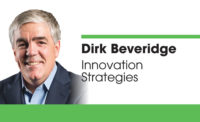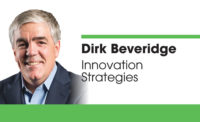Stand for something

What do you stand for?
On June 12, 1987, standing in front of the Brandenburg Gate within sight of the Berlin Wall in West Germany, Ronald Reagan voiced the words, “Mr. Gorbachev, tear down this wall!”
And while history was written at that moment, the line almost did not make it into the speech.
For many reasons, people such as Colin Powell, who was then on the National Security Council, and Reagan Chief of Staff Howard Baker argued hard to have the line removed. As late as when the presidential limousine was approaching the Brandenburg Gate, Reagan still was being “coached” to remove the line so as not to offend the Soviets.
But, Reagan stood for something. For something bold. His unwavering belief in freedom and the evils of communism were undeniable. And it is this stand that not only drove his decision-making but also attracted the American people to him, rising above the sea of sameness all other politicians were trapped in.
Time to be different
It’s easy to get caught in a sea of sameness. Politicians are trapped in a world of sameness — there are thousands of them and they all sound alike. Products on the grocery shelf are caught in a world of sameness as they all look alike.
Across all lines of trade, there are about 250,000 distributors in this country. That is a crazy big number of businesses. The land mass of the United States — from the densely populated inner cities to the vastness of the Western wilderness — is about 3.8 million square miles. That means, on average, there is a distributor every 15 miles across the country. That’s every 15 miles north, south, east and west.
If these 250,000 distributors were evenly distributed (which we know they are not) as you fly over the country at 500 miles per hour, you’d look down and see a distributor every two minutes. Of course with the speed information flows through the Internet at about 670 million MPH, today your customers have access to all 250,000 distributors in nanoseconds.
In this world your customers, prospects, suppliers, partners and desirable employees have quite literally at their fingertips more options than at any other time in history. What draws them to you? What makes them loyal? What creates raving fans?
In this environment why should customers do business with you? Why should the best talent seek you out?
Massively transformative purpose
In his book “Exponential Organizations,” Salim Ismail introduces the concept of massive transformative purpose — a higher, aspirational purpose of an organization. It is another way of asking you to stand for something bold.
When we think small and incremental, we become part of the herd. On the other hand, thinking big aims to capture the hearts and minds and even, as Ismail points out, the imagination and ambitions of those inside and outside the organization. Here are a few examples:
·Apple customers wait in line for hours to buy their products. Apple’s MTP? To think different;
·Google receives 2-3 million job applications each year (57,000 each week). Its MTP is to organize the world’s information.
·JFK moved a country to greatness. His MTP was to put a man on the moon and return him safely to Earth within the decade.
·Rigid packaging distributor Berlin Packaging has created 125 times more value, increasing its valuation from $11.5 million in January 1988 to $1.43 billion in August 2014. Berlin’s MTP is to quantifiably improve the customer’s net income while thrilling them with every interaction.
In all cases, these companies stand for something bold.
Drinking our own Kool-Aid, I work every day to lead the movement of change, innovation and transformation throughout the wholesale distribution industry. My company’s MTP is to catalyze cultures and capabilities of closely held midmarket businesses to build sustainable and relevant businesses for the next 100 years.
What you can do right now
Today, get your management team around a table and explore these questions:
- ·What do we stand for?
- ·How bold is this stance?
- ·Are we capturing the hearts, minds, imaginations and ambitions of those inside and outside the business?
- ·How committed to this are we?
- ·And if you need to think through what your MTP might be, you might ask yourselves, what significant problem needs a champion?
- I know you are no politician, but the world, your markets, customers and employees need you.
- So what do you stand for?
HELPFUL LINKS:
Looking for a reprint of this article?
From high-res PDFs to custom plaques, order your copy today!








